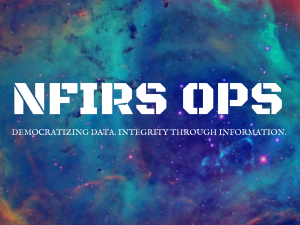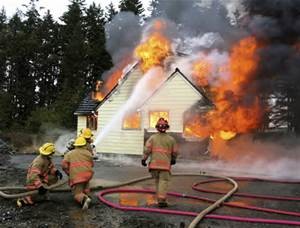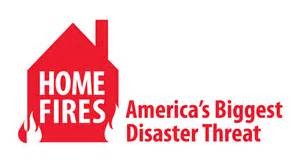By: Sara Wood, NFIRS Program Manager
It’s been 26 months since I took on the role of State NFIRS (National Fire Incident Reporting System) Program  Manager in Kansas. In that time, it feels like I’ve heard every complaint possible about the National Fire Incident Reporting System. Indeed, much of my job is listening to those complaints and solving them. The easiest way to solve a complaint about report writing is to figure out what’s causing it. We need to remember that at its heart NFIRS is simply a “language.” It’s a tool that enables us to “speak” the same way about an event and capture the information consistently.
Manager in Kansas. In that time, it feels like I’ve heard every complaint possible about the National Fire Incident Reporting System. Indeed, much of my job is listening to those complaints and solving them. The easiest way to solve a complaint about report writing is to figure out what’s causing it. We need to remember that at its heart NFIRS is simply a “language.” It’s a tool that enables us to “speak” the same way about an event and capture the information consistently.
Computer problems
If it takes an hour to struggle through a report because a computer is slow nobody is going to have the patience to do that. Frustration about computers is often shifted onto NFIRS. The good news is that you can make your computer faster, right now, using a free tool already loaded with Windows.
It’s called Disk Cleanup. Find it by going to All Programs and clicking the following:
Accessories → System → Tools → Disk Cleanup
It may take a long time to run the first time, but do it about once a month and you’ll notice a big speed difference. Keep the Downloads folder free of anything you no longer need and make sure that your anti-virus program stays up to date. Lastly, consider limiting what users can do on department computers. Shopping, games like bro138 login, social media, etc., all open the computer up to virus attacks and bog down your hard drive. A faster computer makes for faster report writing.
Software issues
The most common cause of NFIRS and report writing complaints are caused by the software package a department  purchased. Remember, NIFRS is a language and that language can be used by any vendor to create a software package.
purchased. Remember, NIFRS is a language and that language can be used by any vendor to create a software package.
Having trouble finding the validation errors? That’s your software. If your report says it’s valid, yet you receive critical errors upon uploading to the state, that’s your software. If you can’t see the full wording of a code, that’s your software. None of these are caused by NFIRS.
NFIRS doesn’t specify what software vendor you buy. That’s your business. Testing and vetting software is the most important step to reducing the majority of report writing problems. Don’t just pick a software off the “registered” vendors on the U.S. Fire Administration website because that’s not actually certifying the vendors’ capabilities.
Before buying, make sure you like how the report writing flows and pay attention to any critical errors. Look at the codes to make sure they are accurate as well. Ask other departments currently using the software before you buy. If you have software that’s not working stop paying the vendor if you can’t get resolution. You might motivate the vendor to improve, or you can shop elsewhere while you save the money you had been paying in “maintenance and license fees.”
Training/Reference Materials
 The second most common cause of NFIRS complaints is training related which can be solved by reference materials and classes. I understand that the Complete Reference Guide (CRG) for NFIRS from the USFA is a few inches thick but there are more materials out there than the CRG. Cruise around some of the State Fire Marshal websites and you’ll find many “cheat sheets” and PowerPoint presentations saved. On my own Office’s website you’ll find a file of short one-page reference guides that detail how to report several common call types. Glancing at the guides can reduce and eventually eliminate most complaints.
The second most common cause of NFIRS complaints is training related which can be solved by reference materials and classes. I understand that the Complete Reference Guide (CRG) for NFIRS from the USFA is a few inches thick but there are more materials out there than the CRG. Cruise around some of the State Fire Marshal websites and you’ll find many “cheat sheets” and PowerPoint presentations saved. On my own Office’s website you’ll find a file of short one-page reference guides that detail how to report several common call types. Glancing at the guides can reduce and eventually eliminate most complaints.
Here’s an example conversation:
“Sara, I can never get a report to validate when we were canceled enroute. I waste so much time for this 4 minute call.”
“What Incident Type are you using?”
“311-EMS.”
“Here’s the reference guide sheet for Canceled enroute. It shows that the only Incident Type you can use is 611-Canceled.”
Eventually, that person stops having any complaints about canceled calls because with the proper reference material it will take about one minute to enter that report.
See Related: The 611-Canceled “Cheat Sheet”
A common complaint received by smaller fire departments occurs when personnel don’t gather the information at the scene. These personnel usually have never completed a report and do not know what information is needed. Solve this problem with a two-prong approach.
First, implement a solid field notes form that goes beyond an address with some lines. Second, get them to a class! They have to know what information is collected. Make them players in your data game and you can reduce the complaints of inadequate information.
Ask your State Program Manager what’s available in your area for NFIRS training or go online to the National Fire Academy and take their online NFIRS self-study class. Encourage everybody on your fire department to get some NFIRS training.
True NFIRS related complaints
OK, this one hurts. There are legitimate NFIRS caused complaints. There are Incident Types that we desperately  need like false medical alarm incidents and non-call fire service injury incidents. Some of the fields even need to be in different locations. For example, Fire Suppression factors would better serve as Mitigation Factors on the Basic module so it could be completed for every call. After all, a foot of snow would affect your response for an EMS call as well as any fire call, right? Currently, we can only capture that factor for fires because of the location of the field.
need like false medical alarm incidents and non-call fire service injury incidents. Some of the fields even need to be in different locations. For example, Fire Suppression factors would better serve as Mitigation Factors on the Basic module so it could be completed for every call. After all, a foot of snow would affect your response for an EMS call as well as any fire call, right? Currently, we can only capture that factor for fires because of the location of the field.
I’m not going to lie. NFIRS needs help, but it needs our help to improve. This is one place where our complaints can do some good but we have to complain to the right people. The National Fire Data Center (NFDC) isn’t even fully funded to fix the known “bugs” in the NFIRS database. They’re just keeping it afloat. The NFDC needs full funding which means the people with the “purse strings” need to hear us, including the State Program Managers.
 What we can do right now is categorize what’s really causing our heartburn with NFIRS so we can begin soothing it. There are far less issues with report writing than most people think. The remaining issues can be fixed but that will take a coalition in the Fire Service for system-wide improvements. I absolutely believe that NFIRS is worth the upgrades it needs because I see every day what it is doing now. I would love to show you my world of data, the world going on right now with the largest database of fire information on Earth.
What we can do right now is categorize what’s really causing our heartburn with NFIRS so we can begin soothing it. There are far less issues with report writing than most people think. The remaining issues can be fixed but that will take a coalition in the Fire Service for system-wide improvements. I absolutely believe that NFIRS is worth the upgrades it needs because I see every day what it is doing now. I would love to show you my world of data, the world going on right now with the largest database of fire information on Earth.
 Fire & EMS Leader Pro The job of old firefighters is to teach young firefighters how to become old firefighters!
Fire & EMS Leader Pro The job of old firefighters is to teach young firefighters how to become old firefighters!